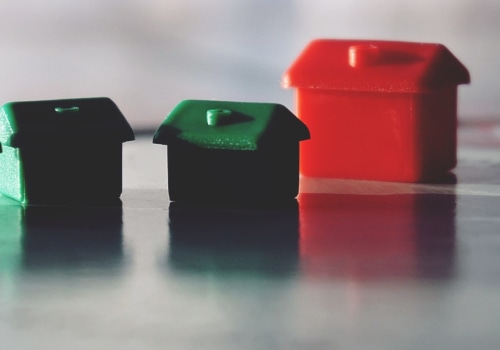These loans have fixed interest rates and typical repayment periods of between five and 30 years. Because your home serves as collateral for a home equity loan. Home Equity Loan Calculator · Discover · US Bank · KeyBank These loans have fixed interest rates and typical repayment periods of between five and 30 years. Because your home serves as collateral for a home equity loan, a lender can foreclosure if you don't make payments.
Bankrate's ranking of the best HELOCs can help you start your search by evaluating interest rates, terms and charges from a variety of lenders. The following resources can also help you learn more about the process of taking advantage of your home's equity and deciding if a HELOC is right for you. Home equity line of credit rates are determined by your financial situation and your credit rating. If you have good credit, your HELOC rate could be between 3 and 5 percent.
If you have below-average credit, you're likely to be within the 9-10 percent range. On the other hand, a home equity loan offers more predictability in terms of monthly payments, since you will receive a large sum of money upfront and pay it back in monthly installments with a fixed interest rate. Home equity loans are often better for people who need a lump sum right away and want a predictable monthly payment. To select the top lenders offering home equity lines of credit (HELOC), Bankrate considered factors that help consumers decide whether a lender is right for them, such as minimum APR and maximum combined loan-to-value ratio.
We are looking for lenders with low rates and a variety of loan amounts for borrowers with different budgets and credit profiles. We are also looking for amenities such as online applications and fast funding. Leveraging Your Home Equity Can Help You Save Money. Answer a few quick questions to see what loan options are available to you.
Please correct the following errors to continue. Please enter an estimate of the value of your property. Open a new U, S or maintain an existing U, S. Customers from certain states are eligible to receive the preferential rate without having a US, S.
Home Equity Loan or Smart Refinance Loan Set up an automatic payment from a new or existing U, S. A home equity line of credit is the most flexible type of housing finance available. During your 10-year retirement period, you can borrow as little or as much as you need, up to your approved line of credit. You have the option of choosing a minimum monthly payment of 1% or 2% of your outstanding balance, although some may qualify to make monthly payments with interest only.
Minimum monthly payment shown in results reflects monthly interest-only payments. As your payments during the withdrawal period are applied to the principal amount you owe, your available credit increases. Once the sweepstakes period ends, the refund period begins. A home equity loan is a one-time installment loan guaranteed by your home.
Both the interest rate and monthly payments are fixed, ensuring you have a predictable payment schedule over the life of the loan. Depending on your situation, the best step to take would be to discuss your home equity options with a bank representative. Bankers are available for virtual, phone and in-person appointments. A Smart Refinance Loan is a no-cost mortgage refinance option that allows you to take advantage of lower rates, withdraw cash at closing, and change the term of your loan to 5, 10, 15 or 20 years.
The monthly payment reflects both the cash withdrawal repayment at closing and the monthly mortgage payment. Smart Refinance can only be used as a home equity loan or refinance of your existing primary residence, and will be a first lien against that home. You can use the money you get at closing for home improvement projects, major purchases, debt consolidation, or other needs. This link takes you to an external website or application, which may have different privacy and security policies than U, S.
We do not own or control the products, services or content found there. A HELOC is a revolving line of credit that you pay, and you only pay interest on the part of the line you use. Like a credit card, a HELOC is a revolving line of credit that you pay and only pay interest on the part of the line you use. The average interest rate for a 15-year fixed-rate home equity loan is currently 5.82%.
The average rate of a variable-rate home equity line of credit is 5.61%. Home equity is the difference between the value of your home and what you owe on the mortgage. A home equity loan allows you to borrow against that equity, and the more equity you have, the more you can borrow. You can typically borrow up to 85% of your home equity, according to the Federal Trade Commission.
Home equity loans allow you to borrow against your home equity, so you can access cash tied up in your home. They often have lower interest rates compared to other types of debt because the loans are secured by your house. Since home equity loans come with fixed interest rates, your monthly payments will never change, and you'll know exactly how much you need to budget to repay the loan. A cash-out refinance only makes sense if you can qualify for a better interest rate on your mortgage and don't mind restoring the payment term.
This means that your interest rate rises or falls over the term of the loan as the market fluctuates, as does your monthly payment, making it difficult to anticipate how much you'll owe. In general, this payment is intended to repay your loan balance with principal and interest installments for the remaining term of the loan, based on the balance and rate information at the time of each monthly calculation. When looking for a home equity loan, look for a competitive interest rate, payment terms that meet your needs, and minimum fees. Also remember to consider your mortgage payment and other monthly expenses when considering borrowing a home equity loan.
When you make monthly payments on a cash-out refinance loan, you pay principal and interest, just like you do with a traditional mortgage. The best home equity loan lenders offer a variety of repayment terms, low interest rates and low fees. While home equity loans can be used for just about anything, borrowing for something you can afford otherwise or don't need can be expensive in the long run. A home equity loan is something to consider if you need a large sum of cash up front, for example, if you are paying for a large home renovation project or debt consolidation.
A home equity loan is worth considering if you need a large sum of cash up front, for example, if you are paying for a large home renovation project or debt consolidation. Usually, 10-year home equity loans come with moderate interest rates that strike a balance between the length of your term and your monthly payment. If you use a home equity loan or HELOC to pay for your home improvements, the interest you pay is generally tax-deductible through the mortgage interest deduction. The combination of the variable rates of a HELOC and the withdrawal and repayment periods make the repayment of the HELOC very unstable, as a home equity loan can provide consistent payments throughout the life of the loan.
To help you understand how rates, terms and payment options work, let's look at each aspect in relation to the different types of home equity products that are available to you. . .





